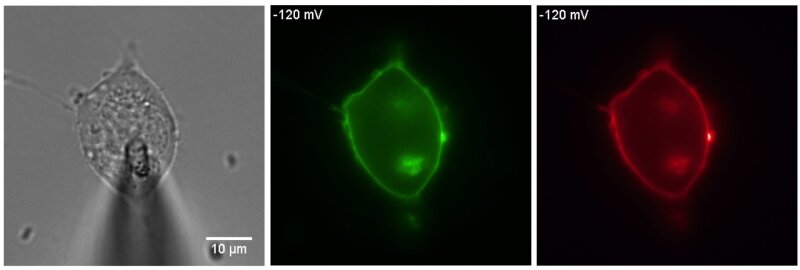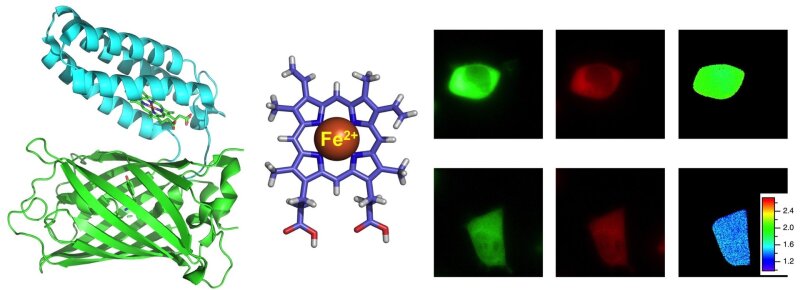Bachelor Sc. / Master Sc.
Application of a Novel Genetically Encoded Voltage Indicator for Quantitative Measurement of Cellular Membrane Potential
GEVI
Image: FSU-BiophysikBackground
The electrical cell membrane potential is a fundamental physiological parameter that governs a vast array of cellular processes, ranging from the action potentials of neurons to cell-cycle progression and proliferation in non-excitable cells. Measuring this potential accurately and non-invasively remains a significant challenge.
Our group has developed and systematically optimized a novel, ratiometric genetically encoded voltage indicator (GEVI). This sensor has demonstrated significantly enhanced voltage sensitivity and photostability, making it a highly promising tool for quantifying absolute membrane potential in living cells with high precision.
Master Thesis Project
This Master's project aims to advance this newly developed sensor from the characterization phase to practical application. The primary goal is to establish a robust system for monitoring the resting membrane potential (RMP) in various cellular contexts using live-cell imaging.
The key objectives of this thesis are:
- Generation of Stable Cell Lines: You will generate and select mammalian cell lines that stably express the optimized GEVI sensor.
- Sensor Calibration: Using whole-cell patch-clamp electrophysiology, you will precisely control the membrane potential of individual cells while simultaneously recording the sensor's ratiometric fluorescence response. This will allow for the creation of a robust calibration curve to convert fluorescence ratios into absolute millivolt values.
- Application and Validation: You will use the calibrated sensor system to perform non-invasive optical measurements of the RMP. You will investigate whether cancerous and non-cancerous cells differ in their resting RMP and test the previously proposed hypothesis that RMP is dependent on cell density.
Techniques
Mammalian Cell Culture, Molecular Biology, Electrophysiology, Live-cell imaging
Target Group
We are seeking a highly motivated student from a Master's program in Molecular Life Science, Biochemistry or a related field.
Contact
Prof. Dr. Stefan H. Heinemann or Dr. Philipp Rühl
Institut für Biochemie und Biophysik
Zentrum für Molekulare Biomedizin (CMB)
Hans-Knöll-Straße 2
07745 Jena
(stefan.h.heinemann@uni-jena.de, philipp.ruehl@uni-jena.de)
Sensorproteine zur Beobachtung intrazellulärer Vorgänge
Heme sensor
Image: FSU - BiophysikHintergrund
Zum Verständnis der molekularen Prozesse, die letztlich zu spezifischen Zellfunktionen führen, benötigt man Kenntnis über den Ort, die Konzentration und ggf. den genauen Zustand von kleinen Signalmolekülen oder auch Signalproteinen in der Zelle. Dazu gibt es eine Vielzahl von Fluoreszenproteinen, die aufgrund der gezielt hergestellen Eigenschaften als Reporter dienen. Trotz der großen Anzahl bereits vorhandener Sensorproteine gibt es immer noch sehr viele Fragestellungen, die nur durch die Entwicklung neuer Varianten bearbeitet werden können.
Thema
Basierend auf umfangreichen Vorarbeiten der Arbeitsgruppe werden Sie an einem ausgewählten Sensoprotein arbeiten. Derzeit suchen wir Interessierte für Projekte zur Detektion von freiem Häm in der Zelle, zur ratiometrischen Messung der intrazellulären Calciumkonzentration sowie zum Nachweis von posttranslationalen Proteinmodifikationen (z.B. Oxidation). Sie werden daher gezielte Veränderungen an bereits vorhandenen Sensorproteinen vornehmen bzw. einen Beitrag zum Design von neuen Varianten leisten. Über spektroskopische und fluoreszenemikroskopische Messungen (inklusive FACS-Analyse) werden Sie die Eigenschaften der Proteine studieren und deren Verwendung zur Beschreibung von Zellfunktionen bewerten.
Wesentliche Methoden
Molekularbiologie (rekombinante DNA-Technologie), Zellbiologie (Zellkultur, FACS-Analyse), Fluoreszenzmikroskopie, Bildauswertung
Zielgruppe
Studierende in Bachelor- und Masterstudiengängen Biochemie, Biologie, Photonik
Kontakt
Prof. Dr. Stefan H. Heinemann
Institut für Biochemie und Biophysik
Zentrum für Molekulare Biomedizin (CMB)
Hans-Knöll-Straße 2
07745 Jena
(stefan.h.heinemann@uni-jena.de)

